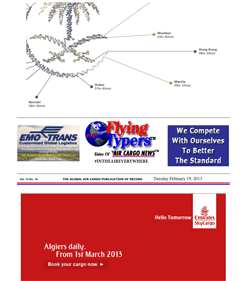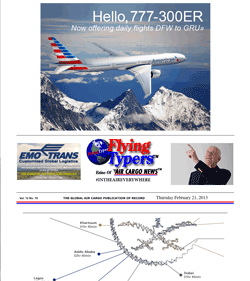| |
|
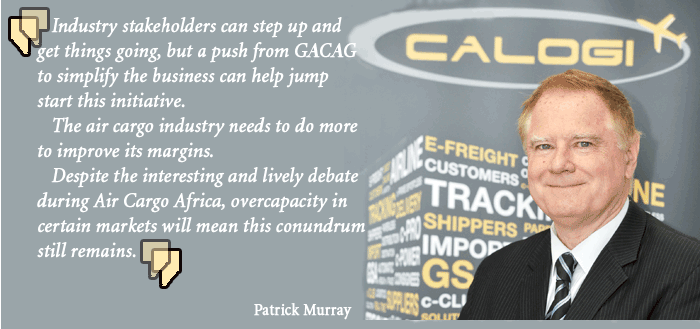 |
We asked Head Of Calogi
Worldwide Cargo Distribution Patrick Murray who attended
and sat on a panel last week at Air Cargo Africa, what his
take was on the event.
“I spent much of my
time taking advantage of the networking opportunities and
learning about the air cargo market in Africa and how Calogi
can support its growth,” he said.
“There is a great deal
of interest in our trading platform and the meteoric rise
of the African market offers many possibilities— both
for Calogi and automated processes.”
Looking at last week’s
discussions at ACA’s ‘The Path to Profitability’
panel provides a window to the action in Johannesburg, South
Africa, where ACA met.
An interesting mix of speakers
from different backgrounds was included, providing a variety
of views on how the industry can stay profitable in the
coming years.
With two aircraft manufacturers
on the panel, the question was asked whether freighters
could be run profitably.
Both suppliers agreed modern cargo jetliners are eco-efficient,
reducing CO2 emissions and noise levels, and allowing cargo
to remove the dependency on airline passenger business and
benefit from opportunities in emerging cargo markets such
as Africa.
It was also noted that there
is room for a simple, low-cost carrier approach to air cargo;
paying a reduced rate for cargo at the time of booking would
improve the airlines cash flow and reduce the number of
no-shows.
The panel also discussed how to make it easier for customers
to do business.
A key point was the popularity
of passenger portals like Expedia, and if the air cargo
industry would accept the transparency of having competing
rates side-by-side.
“Calogi already has
rates side-by-side,” Patrick Murray said.
“My message was clear:
margins will remain under pressure over the next year, meaning
the industry needs to reduce its costs, and one way to accomplish
this is by embracing automation.
“For example, in Dubai
we implemented the e-AWB and e-delivery order for dnata,
which will save the handler around USD $1 million this year,
savings which dnata shares with its customers in the form
of a discount on such electronic transactions.
“When the forwarder
executes the air waybill or requests a delivery order, Calogi
sends the shipment data to the handling system, which creates
the shipment record, calculates the handling charges, and
issues an invoice.
“Currently we process
over half a million shipments a year in this fashion.
“The result is that
dnata has been able to merge the company’s import
and export counters, reducing their cost of airport real
estate and, because of the reduced data entry, redeploy
40 percent of their counter staff to much needed positions.
“Processes like this
are a simple, but innovative feature of Calogi and make
it easier and more cost effective to do business.”
During the three days of Air
Cargo Africa the themes were plentiful, but two messages
seemed to resonate.
The air cargo market is becoming
more competitive and integrators and other modes of transport
are diluting traditional air cargo business.
As an industry, air cargo
needs to give customers an easier way to interact with airlines.
“Industry stakeholders
can step up and get things going, but a push from GACAG
to simplify the business can help jump start this initiative,”
Patrick Murray said, adding:
“The air cargo industry
needs to do more to improve its margins.
“Despite the interesting
and lively debate during Air Cargo Africa, overcapacity
in certain markets will mean this conundrum still remains.”
(Geoffrey)
Geoffrey/Flossie
|
|
Get
On Board Air Cargo News FlyingTypers |
 |
Our
son Ralph is a big fan of the late Stanley Kubrick; in
fact, it can rightly be said that we are all fans of the
filmmaker.
|
If
You Missed Any Of The Previous 3 Issues Of FlyingTypers
|
|||||
|
|||||
FT021413Bulldog |
FT022113 |
||||
|---|---|---|---|---|---|



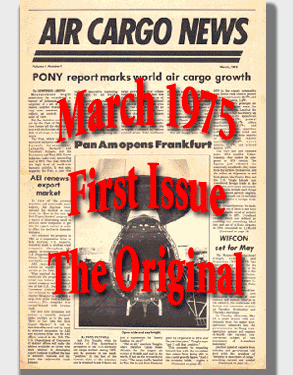
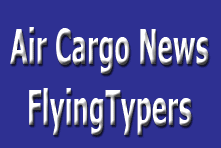


 Nabil
M. Khojah (right) has been named as the new CEO of Saudia
Cargo in Jeddah, as Fahad Hammad, (left) current CEO of
Saudia Cargo, takes up the reins for the development of
current facilities at airports, including the Cargo Village
project at King Abdul Aziz International Airport.
Nabil
M. Khojah (right) has been named as the new CEO of Saudia
Cargo in Jeddah, as Fahad Hammad, (left) current CEO of
Saudia Cargo, takes up the reins for the development of
current facilities at airports, including the Cargo Village
project at King Abdul Aziz International Airport.
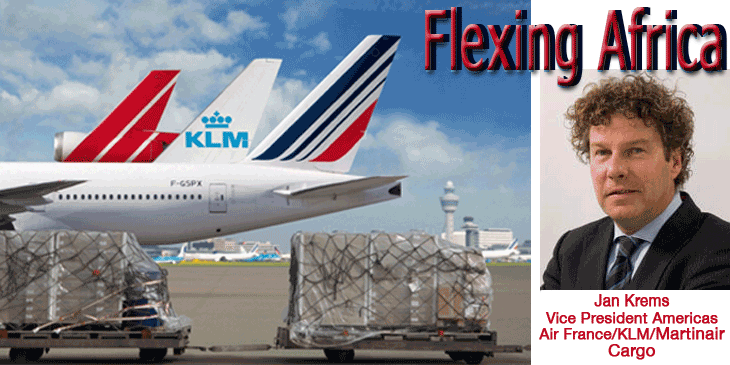
 African
markets are very important to AF-KL-MP Cargo and we are
a major player with both passenger and freighter service
to this continent,” said Jan Krems, Vice President
Americas at Air France/KLM Cargo/Martinair.
African
markets are very important to AF-KL-MP Cargo and we are
a major player with both passenger and freighter service
to this continent,” said Jan Krems, Vice President
Americas at Air France/KLM Cargo/Martinair.
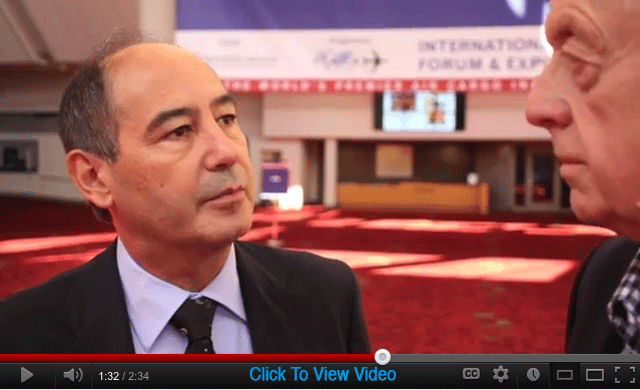
 The exhibition was populated
by major brands and it was encouraging to see local and
regional players being so active and prominent.
The exhibition was populated
by major brands and it was encouraging to see local and
regional players being so active and prominent.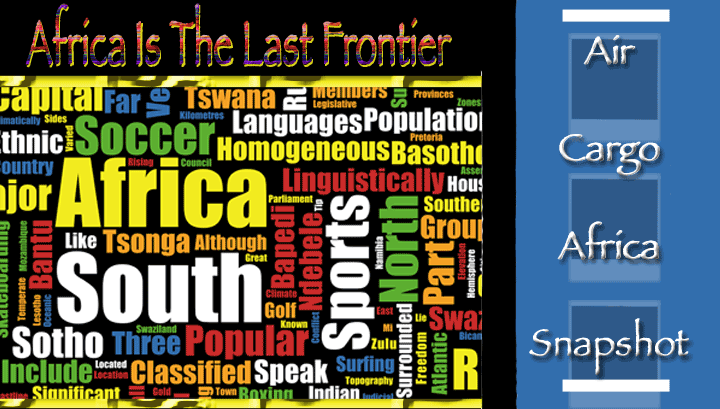
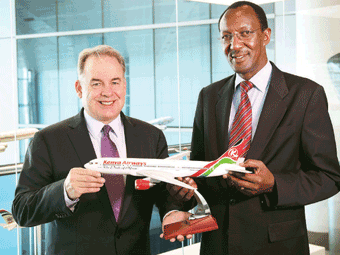 “There
has been a surge in demand for cargo transportation across
Africa, and Kenya Airways has provided a vital link to
the rest of the world,” he said.
“There
has been a surge in demand for cargo transportation across
Africa, and Kenya Airways has provided a vital link to
the rest of the world,” he said. CHAMP
Cargosystems said that Russia’s largest
cargo carrier, AirBridgeCargo
(ABC) implemented a weight & balance solution
that drives better loading of aircraft .
. .
CHAMP
Cargosystems said that Russia’s largest
cargo carrier, AirBridgeCargo
(ABC) implemented a weight & balance solution
that drives better loading of aircraft .
. . 

